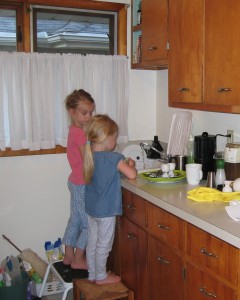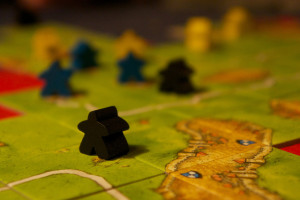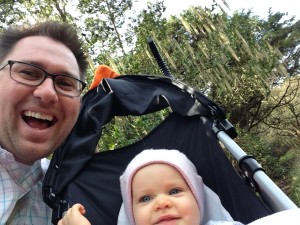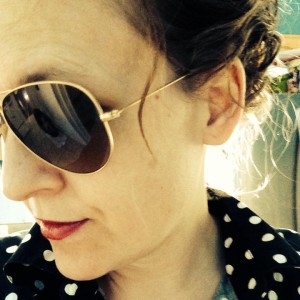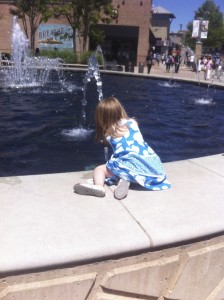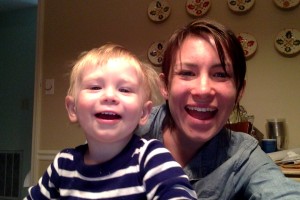I am nine, and I’m standing at the kitchen sink washing the dinner dishes, utterly alone.
The dishes are my job every other evening, which means every other evening I feel a sense of abandonment and despair—the most acute embodiment of “woe is me” that a middle class American child can experience.
It is fall and getting dark earlier, so when I stare mournfully out the kitchen window toward the backyard, hoping for a bit of beauty or distraction, only the vague silhouettes of bare trees and my own sad reflection are there to keep me company.
I’ve finished washing the glasses and silverware, but the piles of tomato-sauce-glazed plates and—worst of all—pots and pans still loom large. In the next room I hear my dad complain about a referee call in the game he’s watching on TV. I hear my mom cheerfully greet Sasha, our dog, as she lets her in from the back yard. My brother passes through purposefully on his way to get a schoolbook from his bedroom. And I am alone with these dishes.
Of course, I’m not really alone. The rest of my family is within reach, but they seem emotionally out of touch. So from an early age this becomes my definition of alone. And I hate it.
* * * *
I am 16 and in the backyard reading Pride and Prejudice for the fourth or fifth time.
It’s spring break. My boyfriend is off on a trip to North Carolina with his best friend, and all of my closest girl friends are somewhere warm with their families. But surprisingly I don’t feel sorry for myself for being stuck at home with nothing to do. Instead, I’m getting a start on my tan, enjoying the rare early-April warmth and indulging in a week of reading books, old and new.
Suddenly it’s easy to remember why reading had been my favorite pastime as a younger child, before it had gotten lost in the mix of boyfriends, tennis practice, school clubs, and a part-time job. On this April day, I’m happily reacquainting myself with my love for books, and also with the warmth of the sun after a long Michigan winter.
I am completely alone but it doesn’t occur to me that I’m alone, because I am completely content.
* * * *
I am 20, a junior in college, and I am falling in love with someone who seems, in at least one important way, to be not like me: I am falling in love with someone who loves to be alone.
He shares an apartment with a group of guys across the hall from where I live with my friends, and an open door policy has been established. As his roommates watch TV before dinner, I watch him take a cup of tea and a book out to the hammock he strung up on the balcony. As my friends and I talk and goof around before bed, I see him walking home alone after several hours in his painting studio.
Suddenly I am certain that “alone” is something I’m not good at, and I see that as a flaw—the result of insecurity and a sign of shallowness. It has not occurred to me that my love for being surrounded by people—for being in the thick of conversation and debates, silliness and laughter—is a product of who I am, how I’m wired.
Likewise, as I’m falling in love with him I see his ability to be alone as something admirable, deep, and brave—not as a product of who he is, how he’s wired.
I’m hopeful I can learn from him.
* * * *
I am 30 and married to the painter—for eight years already. Our toddler and infant are both tucked in their beds for the night, and I am sitting alone on the loveseat in my cozy sunroom, an issue of The New Yorker open on my lap.
As an exhausted young mother, this moment should feel more delicious than it does. The house is quiet, and within the realm of these walls I have the freedom to do whatever I want. But what I want most is companionship, conversation. A look of recognition and understanding, a dose of empathy for whatever small trials the day brought. Someone to help me laugh.
I flip to the magazine’s table of contents, hoping to find something with the right mix of intellect and heart—the sort of piece that engages both my mind and emotions the way a good conversation might.
It is fall, and mostly dark outside the row of tall windows to my right. But in the back corner of our yard a bright square of light shines from the old one-car garage, now a wood shop and studio where my husband works each night on an art project he is preparing for an upcoming show. After this show is installed, there will be another show to prepare.
A lover of logic, I turn to it, hoping to find comfort: My husband teaches all day and needs every hour he can spare to create the art that drives his career. I get that.
My head is able to reason out my aloneness, but that doesn’t make it feel OK anywhere else.
* * * *
I am 34, and I am alone.
My two busy daughters, now four and six, are in bed for the night, their questions and negotiations, stories and songs silenced by sleep.
 I brew a cup of tea then sink gratefully into the sofa to work on a sweater I’m knitting. Remnants of the busy day are scattered here and there throughout the house—a Playmobil scene carefully arranged on the coffee table, too many pairs of shoes and rain boots by the front door, a small stack of dinner dishes in the kitchen sink. But it’s OK, I’ll get to them later.
I brew a cup of tea then sink gratefully into the sofa to work on a sweater I’m knitting. Remnants of the busy day are scattered here and there throughout the house—a Playmobil scene carefully arranged on the coffee table, too many pairs of shoes and rain boots by the front door, a small stack of dinner dishes in the kitchen sink. But it’s OK, I’ll get to them later.
Since my divorce, I’ve been able to let go of the unhelpful sense that it’s someone’s job to keep me company. I’ve also been able to quiet the inner nag insisting that it’s my job to keep the house clean. When you’re alone, the consequences of waking up to a messy kitchen are also yours alone. Maybe it’s time to teach the girls how to wash the dishes, I think, as I pick up my knitting.
For now, I’m just sitting on my sofa, alone, and it is good. It’s good because I’ve finally learned that alone and lonely are two different things. I’ve learned that being someone who derives energy and ideas from interactions with others is a part of me to embrace and nurture, not to fight. And I’ve learned that savoring time alone allows me to process and express all that I’ve soaked in from being with others.
Now I can see that “alone” has always been important to me, and I’ve even been good at it, in my own way. Finally I’m able to call it what it is—just “alone,” apart from lonely—and embrace it for what it is: a gift of respite and reflection, and nothing to fear.
* * * *
(No one should ever do dishes alone.)
